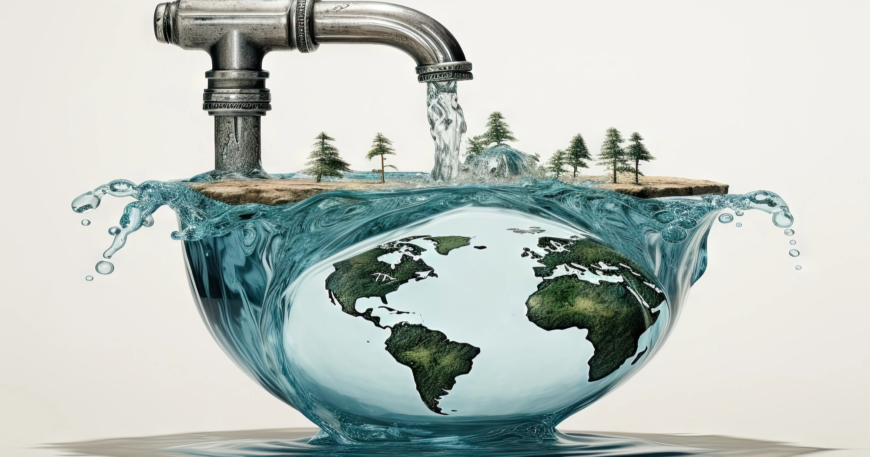How Wastewater Treatment Protects Our Ecosystems
Our planet’s ecosystems are intricately linked, and every part plays a role in maintaining the delicate balance of life. One of the most vital yet often overlooked aspects of environmental protection is the treatment of wastewater. Wastewater—whether from homes, industries, or agriculture—can carry harmful pollutants that threaten aquatic life, soil health, and even human well-being. Proper treatment of wastewater is essential for safeguarding the ecosystems that rely on clean water to thrive. Let’s dive into how wastewater treatment works to protect our ecosystems and why it’s so important for the health of the planet.
What is Wastewater?
Before we explore how wastewater treatment helps protect ecosystems, it’s important to understand what wastewater is. Wastewater is water that has been contaminated by human use. It comes from a variety of sources, including:
- Domestic Wastewater: Water from our homes—such as from toilets, sinks, showers, and washing machines.
- Industrial Wastewater: Water used in manufacturing, processing, and other industrial activities that may contain chemicals, metals, or toxins.
- Stormwater Runoff: Water from rainfall that picks up pollutants like oil, litter, pesticides, and fertilizers as it flows over land and into water bodies.
If not properly managed, wastewater can introduce pollutants into natural water sources, which disrupts ecosystems and harms both wildlife and plant life.
The Impact of Untreated Wastewater on Ecosystems
When wastewater is not treated or properly managed, it can have devastating consequences for ecosystems. Here are some of the key ways untreated wastewater harms the environment:
- Pollution of Water Bodies
Wastewater often contains harmful substances like bacteria, viruses, oils, chemicals, and nutrients (such as nitrogen and phosphorus). When released into rivers, lakes, or oceans, these pollutants can degrade water quality and harm aquatic life. Contaminated water can suffocate fish, disrupt reproductive cycles, and poison plants and animals that rely on clean water. - Eutrophication and Algal Blooms
Excess nutrients, particularly nitrogen and phosphorus, are a major problem in untreated wastewater. These nutrients stimulate the rapid growth of algae, leading to a phenomenon called eutrophication. The algae consume oxygen in the water, creating dead zones where fish and other marine creatures cannot survive. Harmful algal blooms can also produce toxins that are harmful to marine life and humans. - Habitat Destruction
Pollutants in wastewater can also damage the habitats of aquatic organisms. Chemicals, heavy metals, and oil can destroy coral reefs, contaminate sediments, and harm the breeding grounds of fish and amphibians. Many species that rely on these habitats may face population declines or even extinction. - Disruption of the Food Chain
Contaminants from untreated wastewater can enter the food chain. Small organisms like plankton absorb toxins and chemicals from polluted water, which are then consumed by fish and other predators. This accumulation of pollutants as they move up the food chain can affect the health of species at every level, including humans who rely on seafood for nutrition.
How Wastewater Treatment Helps Protect Ecosystems
Wastewater treatment is an essential process for protecting our ecosystems. By removing harmful pollutants and reducing contaminants in wastewater before it is released into natural water sources, treatment processes help ensure the sustainability of aquatic habitats and preserve biodiversity. Here’s how wastewater treatment helps:
- Removing Harmful Pollutants
One of the key goals of wastewater treatment is to remove contaminants such as pathogens, oils, chemicals, heavy metals, and toxins. Various stages of treatment, including physical filtration, biological processes, and chemical treatments, help eliminate harmful substances before water is discharged back into the environment. By ensuring that treated water meets safety standards, treatment plants protect aquatic ecosystems from the toxic effects of these pollutants. - Reducing Nutrient Loads and Preventing Eutrophication
Advanced wastewater treatment processes, like nitrification and denitrification, help remove excess nitrogen and phosphorus, which are major contributors to eutrophication. By removing these nutrients before wastewater is returned to rivers or oceans, treatment plants help prevent algal blooms and oxygen depletion, allowing aquatic life to thrive. - Protecting Marine and Freshwater Ecosystems
Wastewater treatment plants play a vital role in maintaining the health of both freshwater and marine ecosystems. When treated water is returned to rivers, lakes, or oceans, it has minimal impact on water quality, supporting healthy fish populations, aquatic plants, and other wildlife. This, in turn, helps maintain the balance of ecosystems that rely on these water bodies for food, shelter, and breeding grounds. - Promoting Biodiversity
By improving water quality, wastewater treatment helps protect the diverse range of species that depend on clean water to survive. Healthy ecosystems are crucial for biodiversity, as they provide the necessary conditions for plants and animals to thrive. Wastewater treatment ensures that these ecosystems remain balanced, resilient, and capable of supporting a wide range of life forms. - Restoring Natural Habitat Function
Wastewater treatment also plays a role in restoring habitats that have been damaged by pollution. Constructed wetlands, for example, can be used as part of wastewater treatment processes, mimicking natural filtration systems to clean water before it is released into surrounding ecosystems. These methods can help restore the natural functions of wetlands and other habitats, contributing to overall ecosystem health.
Innovative Approaches to Wastewater Treatment for Ecosystem Protection
Recent advances in wastewater treatment are making the process more efficient and environmentally friendly. Here are some innovative approaches that are improving the way wastewater is treated and how it benefits ecosystems:
- Green Infrastructure
Green infrastructure, like constructed wetlands and bio filtration systems, uses natural processes to treat wastewater. These systems mimic the filtration functions of natural ecosystems like swamps and forests and are highly effective in removing contaminants while preserving biodiversity. - Resource Recovery
Modern wastewater treatment plants are moving towards resource recovery, where they not only treat water but also extract valuable resources, like nutrients and biogas, from wastewater. This approach minimizes waste and reduces the environmental impact of wastewater treatment. - Decentralized Treatment Systems
In some areas, small-scale, decentralized wastewater treatment systems are being implemented to treat water closer to where it’s generated. These systems are more sustainable, less resource-intensive, and can help protect local ecosystems by reducing the need for large-scale treatment plants and transportation of wastewater over long distances.
The Role of Individuals in Ecosystem Protection
While wastewater treatment facilities are essential for large-scale water management, individuals also have a role to play in protecting ecosystems:
- Reduce Water Pollution: Avoid dumping chemicals, oil, and non-biodegradable materials down drains and toilets. Use eco-friendly cleaning products that won’t harm aquatic ecosystems.
- Conserve Water: By reducing water usage, you help lessen the strain on wastewater treatment plants and decrease the volume of pollutants being released into the environment.
- Support Sustainable Practices: Advocate for and support policies that promote better wastewater management and pollution control in your community.
Conclusion :
Wastewater treatment is a cornerstone of environmental protection, playing a crucial role in preserving our ecosystems and maintaining biodiversity. By removing harmful pollutants, reducing nutrient loads, and improving water quality, wastewater treatment helps ensure the survival of aquatic life and the balance of natural ecosystems. With continued innovation and a growing commitment to sustainability, we can further enhance wastewater treatment processes and protect the planet’s vital water resources for future generations.
This blog outlines the connection between wastewater treatment and ecosystem protection, emphasizing the importance of clean water for environmental health. Let me know if you’d like to dive deeper into any specific aspects or need more details!






